Book contents
- Frontmatter
- Dedication
- Contents
- List of Maps, Figures, and Tables
- List of Abbreviations
- A Note on Terminology
- Acknowledgments
- 1 Introduction
- Part I Theory
- Part II Data
- 6 India as a Patronage-Democracy
- 7 The Bahujan Samaj Party (Bsp) and the Scheduled Castes (SCs)
- 8 Why Sc Elites Join the Bsp
- 9 Why Sc Elites Join the Bsp
- 10 Why Sc Voter Preferences Translate into Bsp Votes
- 11 Explaining Different Head Counts in the Bsp and Congress
- 12 Extending the Argument to Other Ethnic Parties in India: The Bjp, The Dmk, and The Jmm
- 13 Ethnic Head Counts and Democratic Stability
- Appendix A Elite Interviews
- Appendix B Ethnographies of Election Campaigns
- Appendix C Content Analysis
- Appendix D Description of Survey Data
- Appendix E Description of the Ecological Inference (EI) Method
- Appendix F Method Used to Estimate Ethnic Voting Patterns
- Bibliography
- Index
- Miscellaneous Endmatter
12 - Extending the Argument to Other Ethnic Parties in India: The Bjp, The Dmk, and The Jmm
from Part II - Data
Published online by Cambridge University Press: 19 October 2017
- Frontmatter
- Dedication
- Contents
- List of Maps, Figures, and Tables
- List of Abbreviations
- A Note on Terminology
- Acknowledgments
- 1 Introduction
- Part I Theory
- Part II Data
- 6 India as a Patronage-Democracy
- 7 The Bahujan Samaj Party (Bsp) and the Scheduled Castes (SCs)
- 8 Why Sc Elites Join the Bsp
- 9 Why Sc Elites Join the Bsp
- 10 Why Sc Voter Preferences Translate into Bsp Votes
- 11 Explaining Different Head Counts in the Bsp and Congress
- 12 Extending the Argument to Other Ethnic Parties in India: The Bjp, The Dmk, and The Jmm
- 13 Ethnic Head Counts and Democratic Stability
- Appendix A Elite Interviews
- Appendix B Ethnographies of Election Campaigns
- Appendix C Content Analysis
- Appendix D Description of Survey Data
- Appendix E Description of the Ecological Inference (EI) Method
- Appendix F Method Used to Estimate Ethnic Voting Patterns
- Bibliography
- Index
- Miscellaneous Endmatter
Summary
This chapter applies the hypothesis developed through the study of the BSP to three other ethnic parties in India: the pro-Hindu Bharatiya Janata Party (BJP) in India's 1991 parliamentary elections (section I); the pro-Tamil Dravida Munnetra Kazagham(DMK)in the state of Tamil Nadu in the 1967 legislative assembly elections (section II); and the pro-Jharkhand Jharkhand Mukti Morcha (JMM), a regionalist party that called for the creation of a new state of Jharkhand out of the state of Bihar and its neighbours, in the 2000 legislative assembly elections in Bihar (section III). I rely for these analyses mainly on several excellent secondary studies of these parties and their vote bases. The data available from these studies are not sufficiently precise to permit a systematic evaluation of the argument. Instead, I hope to show only that in each case, the hypothesis proposed in this book generates a more plausible explanation than the alternatives for an otherwise puzzling outcome.
I select these three parties in order to maximize the range of variation in the data, keeping the condition of patronage-democracy constant. The three parties differ, first, in the type of category that they sought to mobilize. The BJP in 1991 targeted the religion-based category “Hindu.” TheDMK defined its target ethnic category in 1967 as a linguistic/regional category of Tamil speakers in Tamil Nadu. The Jharkhand Mukti Morcha defined its target ethnic category in 2000 as “Jharkhandis,” by which it meant all inhabitants of the Jharkhand region. Second, they differ in the relative size of their target ethnic categories: Hindus in India and Tamil speakers in Tamil Nadu are both majority categories, while Jharkhandis constituted a regionally concentrated minority within Bihar. Third, they differ in the size of the political arena in which they operated: The BJP in 1991 was a nationwide party; theDMKin 1967 concentrated its efforts in the southern state of Tamil Nadu; and the Jharkhand Mukti Morcha in 2000 contested in the state of Bihar. Finally, the three parties differ in the type of elections and the time period chosen for analysis.
- Type
- Chapter
- Information
- Why Ethnic Parties SucceedPatronage and Ethnic Head Counts in India, pp. 262 - 286Publisher: Cambridge University PressPrint publication year: 2004



